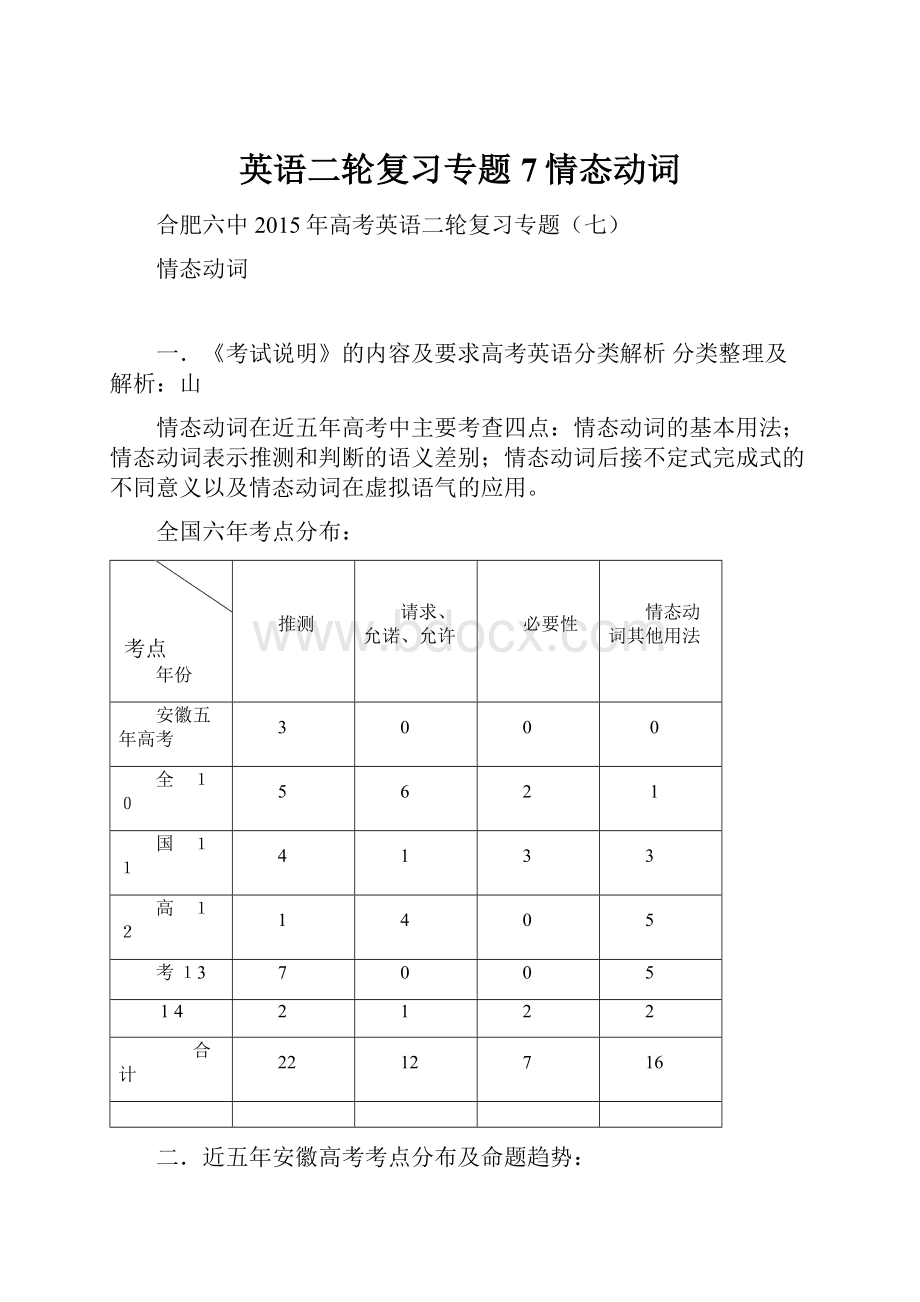英语二轮复习专题7情态动词.docx
《英语二轮复习专题7情态动词.docx》由会员分享,可在线阅读,更多相关《英语二轮复习专题7情态动词.docx(18页珍藏版)》请在冰豆网上搜索。

英语二轮复习专题7情态动词
合肥六中2015年高考英语二轮复习专题(七)
情态动词
一.《考试说明》的内容及要求高考英语分类解析分类整理及解析:
山
情态动词在近五年高考中主要考查四点:
情态动词的基本用法;情态动词表示推测和判断的语义差别;情态动词后接不定式完成式的不同意义以及情态动词在虚拟语气的应用。
全国六年考点分布:
考点
年份
推测
请求、允诺、允许
必要性
情态动词其他用法
安徽五年高考
3
0
0
0
全 10
5
6
2
1
国 11
4
1
3
3
高 12
1
4
0
5
考13
7
0
0
5
14
2
1
2
2
合计
22
12
7
16
二.近五年安徽高考考点分布及命题趋势:
年份
题号
考点
2014
30
虚拟
2013
34
推测
2012
31
虚拟
2011
26
推测
2010
32
推测
纵观安徽五年高考,情态动词是重点考查项目。
高考的热点依然是
(1)情态动词表示推测和可能性;
(2)情态动词+havedone结构;(3)shall,should,can,must表示特定语气。
今后高考趋势将更加注重在具体语言环境中,根据说话人的语气来使用情态动词的能力;同时会涉及部分情态动词的特殊含义。
三.一轮复习中存在的问题
有些考生在一轮复习中存在的问题:
1未能区分具有相同功能的、意思相近的情态动词,特别是对于某些情态动词的特殊用法以及情态动词+havedone的结构不熟悉;
2未能根据句子提供的情境选择恰当的情态动词;
四.教学重点和教学策略
考生要掌握情态动词的意义和用法,除了要能够准确掌握他们的基本用法外,还要充分利用高考试题所设置的语境来分析句子之间所体现的特殊关系,同时能够区别具有相同功能的、意义相近的情态动词的用法,并结合虚拟语气的语境去领悟他们的用法特征。
五.专题教学主要内容
(一)情态动词的基本用法
1.can/could
(1)表示能力。
Hecancompletetheworkontime.
(2)表示理论上的可能性,“有时候可能会。
”Evenanexperiencedteachercanmakemistakes.
(3)表示惊讶,常用在否定句和疑问句中。
Howcouldyoudosuchasillything?
(4)表示请求和允许。
表示请求时,口语中常用could代替can。
—CouldIborrowyourbikeforamoment?
—Yes,you______./Sure.Goahead./Pleasehelpyourself.
2.may/might
(1)表示允许、许可。
might比may语气更委婉。
Youmayusemycar.
(2)表示请求。
might比may语气更委婉。
—MightIhavealookatyournewcomputer?
—Yes,youmay./No,youmustn’t
(3)may+主语+动词原形“祝某人/物…”不用might.
Mayyousucceedinthecomingexam!
3.must
(1)表示必须,应该。
Wemustgettoschoolontime.
—MustIhandinmyhomework?
—Yes,you______.No,you_________.
(2)表示禁止(用于否定句)。
Smokingmustnotbeallowedintheoffice.
(3)表示偏要,非得。
Whymustyoubetalkingsoloudlywhileothersarestudying?
Ifyoumustgothere,Iagree.
4.shall
(1)在第一、三人称的疑问句中,用于征求对方的意见或指示。
—HasMr.Wangarrived?
—Yes,already.Shallhewaitoutsideorjustcomein?
(2)在第二、三人的陈述句中,表示命令、警告、允诺或威胁。
Heshallgetasumofmoneyifheistocompletethetaskaheadoftime.
(3)用于条约,规定,规章等文件中,表示一种义务,多用于第三人称中。
Theschoolrulesstatethatnochildshallbeallowedoutoftheschoolunlessaccompaniedbyanadult.
5should
(1)表示劝告和建议,作“应该”讲。
Youshouldlearnfromeachother.
(2)表示预测可能性,并意为“按道理,常识,情理,经验的应该”。
It’snearly7o’clock.Jackshouldbehereatthemoment.
TheplayersfromGuangzhouEvergrandFootballClubhavebeendoingverywellrecently,sothey _____winthefinalmatch.
A.need B.might C.would D.should
(3)表示惊讶:
“竟然,居然”。
Iamsurprisedthatyoushouldspeakinsuchaway.
(4)在if条件句中,表示可能性很小“万一”。
Ifanyoneshouldcome,sayI’mnotathome.
6.will/would
(1)表示自愿做或主动提出做什么,如意志、愿望或决心等。
would用于过去的情况。
Ihavetoldhimagainandagaintostopsmoking,buthewon’tlisten.
Ipushedthedoor,butitwouldn’topen.
(2)表示一种习惯性的动作,有“总是”或“总要”之意。
would表示过去的习惯性动作。
Everymorninghewillhaveawalkalongthisriver.
Whenhewasyoung,hewouldlistentomusicaloneinhisroom.
(3)表示请求和建议。
would更加委婉客气些。
Wouldyoulikesomecoffee?
(4)表示事物和某种倾向或性质。
Anybodywilldie.
Woodwillfloatonthewater.
7.need/dare
need表需要和必须常用于否定句和疑问句;dare表敢,常用于否定句,疑问句和条件句中。
Idaresay是习惯用法,意思为:
“我想,大概”。
dare与need用做实意动词时有时态,人称和数的变化,但dare用于否定句和疑问句时常接不带to的不定式,need后要接带to的不定式。
—Needwemakethetest?
—Yes,we______./No,we_______.
Howdareyoutalklikethat?
Doeseveryonedare(to)gotherealone?
8.oughtto
表示义务,意思为“应当”,相当于should。
Everyoneoughttoobeythetrafficregulations.
(二)易混淆情态动词比较
1can(could)/beableto
can,beableto都可表示“能力”can的主语是人或物,beableto的主语是人。
Shecan/beabletosingthesonginEnglish.
Thismachinecanmakeyoufeelcomfortable.
can只用于现在时和过去时(could)。
be able to可以用于各种时态。
We’llbeabletofinishtheworksoon.
Ihaven’tbeenabletoseethefilm.
could用于表示泛指过去的能力;而表示特定的某一过去能力或表示成功地做了某事时,只能用was/were able to,不能用could。
I could read when I was four.
HewasabletofleeEuropebeforethewarbrokeout.
=HemanagedtofleeEuropebeforethewarbrokeout.
=HesucceededinfleeingEuropebeforethewarbrokeout.
2must/haveto
must侧重表示说话人的主观看法;haveto表示客观需要。
Wemustrelyonourselves.
Ihavetogiveitupbecauseofmyillness.
3would/usedto
would作为will的过去式,表示过去习惯性或重复性的动作,没有与现在对比的含义;usedto表示过去经常发生的动作或存在的状态,强调今昔对比。
Lastyear,ourEnglishteacherwouldsometimestellstoriesafterclass.
Whenshewasyoung,sheusedtobeveryfat.
Iusedtohaveacar.
特别提醒
1can’t/cannever…..enough/too表示“再…..也不为过”。
Wecan’tbecarefulenoughwhiledriving.
2may的一些固定搭配
maywell+动词原形,表示“完全能,很可能”。
Herappearancehaschangedsomuchthatyoumaywellnotrecognizeher.
may/mightaswell+动词原形,表示“最好,倒不如”。
Youmay/mightaswelldoitatonce.
(三)情态动词表推测
1.must表示推测时只能用于肯定句中,意为“一定,必定”,表示十分肯定(在疑问句中或否定句中要用can)。
—Hi,Tom.AnyideawhereJaneis?
—Shemustbeintheclassroom.Isawhertherejustnow.
2.can/could用于肯定句中有时可以用来表示推测,意为“有时会”;用于疑问句中可以表示推测,意为“可能”,有时表示一种惊讶的语气;用于否定句中也可以表示推测,can’t意为“不可能”,语气很强烈。
MrBushisontimeforeverything.Howcanitbethathewaslateforthemeeting?
ItisusuallywarminmyhometowninMarch,butitcanberathercoldsometimes.
3.may/might用于肯定句中可以用来表示推测,意为“可能”;用于否定句中也可以表示推测,maynot意为“可能不”,表示一种不太确定的语气。
Thetrafficisheavythesedays.Imightarriveabitlate,socouldyousavemeaplace?
Lizamaywellnotwanttogoonthetrip—shehatestraveling.
4.Should/oughtto用来表示推测时意为“应该”,即含有“按道理来说应当如此”的意思。
ThepublictransportinBeijingisveryconvenient,sothereshouldn’tbeanydifficultyintravelingaroundthecity.
5.will/would用于肯定句、否定句和疑问句中,表示“大概”。
Itwouldbeabouttenwhenhelefthome.
(四)情态动词+不定式的完成式(havedone)的用法
1对过去的推测
(1)musthavedone表示对过去行为的推测,用于肯定句中,意为“一定,想必”,语气十分肯定。
ItmusthavebeenTomthatparkedthecarhere,asheistheonlyonewithacar.
(2)may/mighthavedone表示对过去行为的推测,用于否定句和疑问句中,意为“可能做过”。
might所表示的可能性比较弱,语气较委婉。
It’stoolate.Ithinkhemayhavegonetobed.
(3)can/couldhavedone表示对过去行为的推测,用于否定句和疑问句中,表示对过去发生的行为怀疑或不肯定,其中can’thavedone多用于语气强烈的否定,意为“不可能做过”。
Shecan’thaveleftschool,forherbikeisstillhere.
2.表示与实际情况相反的虚拟
(1)should/oughttohavedone用于肯定句时,表示本该做某事,而实际上未做;用于否定句时,则表示不该做的事反而做了。
I’mnotfeelingwellinthestomach.Ishouldn’thaveeatensomuchfriedchickenjustnow.
Yououghtn’ttohavebeenlateforyesterdayclassmeeting,asitwassoimportant.
(2)needn’thavedone表示本来不必做某事而实际上却做了。
Iactuallyneedn’thaveboughtsomuchwine—onlythreepeoplecame.
(3)couldhavedone表示过去能做而未做的事情
Youcouldhavedonebetter,butyouweretoocareless.
(4)mighthavedone表示本来应该或可以做某事,含有轻微责备语气
Youmighthavegivenhimmorehelp,thoughyouwerebusy.
--Ileftmywalletonthetrain,butluckilysomeonepickeditupandgaveittome.
--Howbelievable!
Ithoughtsomeonemighthavestolenit.
(5)hadbetterhavedone表示当时最好做了某事,用于事后的建议,含轻微责备语气
Youhadbetterhavestartedearlier.
(6)wouldratherhavedone表示当时宁愿做了某事
Iwouldratherhavetakenhisadvice.
六精讲例题
1Thebiggestproblemformostplants,which_____justgetupandrunawaywhenthreatened,isthatanimalsliketoeatthem.
A.shan’tB.can’tC.needn’tD.mustn’t
2Ifitwerenotforthefactthatshe_____sing,Iwouldinvitehertotheparty.
A.couldn’tB.shouldn’tC.can’tD.mightnot
3Oneofthefewthingsyou____sayaboutEnglishpeoplewithcertaintyisthattheytalkalotabouttheweather.
A.need B.must C.should D.can
4Tomisusuallyeasy-going,he_____besometimesquiteannoying.
A.mustB.needC.canD.should
5Who______itbeatthistimeofday?
A.canB.mayC.mustD.haveto
6.—________Itakethebookout?
—I’mafraidnot.
A.Will B.MayC.Must D.Need
7._____ourfriendshiplastforever!
A.MayB.WillC.MustD.Can
8—MayItakethisbookoutofthereadingroom?
—No,you.Youreaditinhere.
A.mightn’tB.won’tC.needn’tD.mustn’t
9—Musthecometosignthispaperhimself?
—Yes,he_____..
A.needB.mustC.mayD.will
10.—CouldIhaveawordwithyou,mum?
—Ohdear,ifyou_____..
A.canB.mustC.mayD.should
11. Ican’tleave.ShetoldmethatI stayhereuntilshecomesback.
A.can B.must C.will D.may
12.—Whatdoesthesignoverthereread?
—“Noperson______smokeorcarryalightedcigarette,cigarorpipeinthisarea.”
A.willB.mayC.shallD.must
13.—Ihaven’tgotthereferencebookyet,butI’llhaveatestonthesubjectnextmonth.
—Don’tworry.You______haveitbyFriday.
A.couldB.shallC.mustD.may
14.—______IturnontheTVforyou,Grandpa?
—Yes,thanksalot,mydear.
A.MayB.ShallC.willD.need
15.—What’sthename?
—Khulaifi.____Ispellthatforyou?
A.ShallB.WouldC.CanD.Might
16.—IthinkI’llgiveBobaring.
—You_____.Youhaven’tbeenintouchwithhimforages.
A.willB.mayC.havetoD.should
17.Thisprinterisofgoodquality.Ifit_______breakdownwithinthefirstyear,wewouldrepairitatourexpense.
A.would B.should C.could D.might
18.Whatdoyoumean,thereareonlytentickets?
There betwelve
A.should B.would C.will D.shall
19.Johnpromisedhisdoctorhe notsmoke,andhehasneversmokedeversince.
A.might B.should C.could D.would
20.Couldyoulendmeahand?
Mydrawer______open.
A.mustn’tB.can’tC.maynotD.won’t
21.Whenweworkedinthesamefirmseveralyearsago,we________oftengotothecinematogether.
A.would B.willC.shall D.could
22.Someaspectsofapilot’sjob______beboring,andpilotsoften____workatinconvenienthours.
A.can;havetoB.may;canC.haveto;mayD.oughtto;must
23.—Whatdoyouthinkwecandoforouragedparents